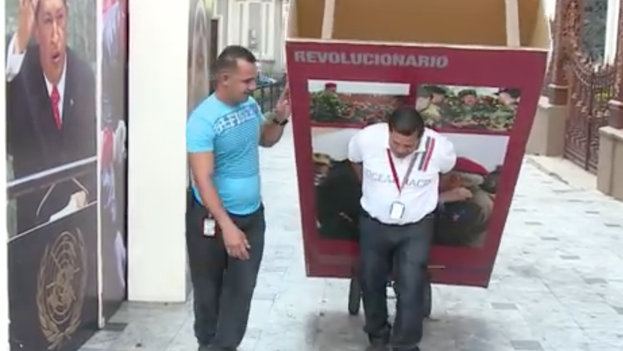
![]() 14ymedio, Carlos Alberto Montaner, Miami, 9 January 2016 – I couldn’t avoid the sense of déjà vu. It brought to mind Eduardo Suarez, formerly with El Mundo, a professional of the image with a fine instinct for the news. Hugo Chavez’s photographs being expelled from the new Venezuelan National Assembly brought back to me the unforgettable episodes at the end of European communism, with the statues of Stalin rolling on the ground in the midst of a glorious dust.
14ymedio, Carlos Alberto Montaner, Miami, 9 January 2016 – I couldn’t avoid the sense of déjà vu. It brought to mind Eduardo Suarez, formerly with El Mundo, a professional of the image with a fine instinct for the news. Hugo Chavez’s photographs being expelled from the new Venezuelan National Assembly brought back to me the unforgettable episodes at the end of European communism, with the statues of Stalin rolling on the ground in the midst of a glorious dust.
Somehow, what happened in Caracas is a continuation of those events. It is with good reason that the Chavistas and their fellow travelers proclaimed themselves cultivators of 21st Century Socialism, although with much less violence than that of the 20th century, but with the same level of incompetence and perhaps even more corruption. It was the enormous amount of patronage, collectivism and disdain for the ways of liberal democracy that allowed this to happen, in the time after the fall of the Berlin Wall and the total discrediting of Marxist superstitions.
Henry Ramos Allup, the new president of Venezuela’s National Assembly, has done well, starting his work without fear. Not only does he have reason behind him, but also the Constitution and two-thirds of the seats in parliament. According to a Datincorp survey, 81% of Venezuelans reject Nicolas Maduro’s call to ignore the decisions of the new parliament.
The clearest priority of this anguished society is to relieve its grave economic problems, but this rescue operation begins by respecting the popular will, expressed in the designation of 112 deputies, not one less, and in releasing to the streets the hundreds of unjustly imprisoned political prisoners, led by Leopold Lopez and Antonia Ledezma. Venezuela’s national poet, Andres Eloy Blanco, anticipated it many years ago: “I sowed the stars / held in the heart / and it was good like the day / the prisoners were freed.”
Former Spanish president Felipe Gonzalez warned Maduro with great urgency. Venezuela is heading into a humanitarian crisis. Bad governance has decimated the productive capacity of the country, there is not enough food, medicine nor the money to import them, and international credit is finished.
As Maduro continued to chat with the birds, indifferent to reality, and as his new minister of the economy can’t find his right hand and ended up pulverizing the rubble, the only hope for rectification is the set of measures that can be taken by the National Assembly.
Second, inflation takes off and the government responds with price controls and the printing of money, which worsens the crisis. The third stage is complete chaos: shortages, an exponential increase in poverty, and a virtual collapse of the system.
The fourth, which Venezuelans should be experiencing now if Maduro weren’t so blatantly ignorant, is the adjustment. Prices must be reconciled, public spending cut and the productive apparatus revitalized by opening the doors to entrepreneurs and national and foreign investors, which requires respect for private property and a trustworthy judicial system.
21st Century Socialism arose with the petrodollars of Hugo Chavez’s Venezuela, under the treacherous direction of the Castros, and will end up with the collapse of this artificial, absurd and, above all, unaffordable, little world. Fortunately, as happened with the communist counties of Europe, the transition will probably be peaceful and carried out via legitimate elections. He who kills through ballot box, dies through the ballot box.
